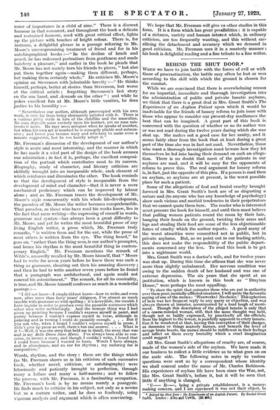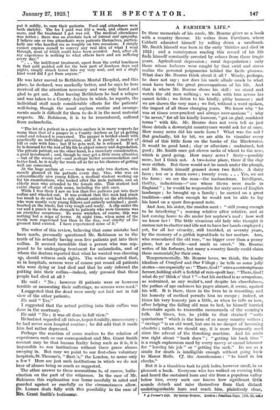BEHIND THE SHUT DOOR.* WHEN we have to join battle
with the forces of evil or with those of procrastination, the battle may often be lost or won according to the skill with which the ground is chosen for the combat.
While we are convinced that there is overwhelming reason for an impartial, immediate and thorough investigation into the administration of public and private lunatic asylums, we think that there is a great deal in Mrs. Grant Smith's The Experiences of an Asylum Patient upon which it would be inadvisable for the friends of lunacy reform to join issue with those who appear to consider our present-day madhouses the best that can be imagined. A great part of this book is concerned with the question of whether or no its author was or was not mad during the twelve years during which she was shut up. She makes out a good case for her sanity, and it seems fairly clear from the book that at least during a great part of the time she was in fact not mad. Nevertheless, those who want a thorough investigation must beware how they let themselves be led into basing their demand on such an allega- tion. There is no doubt that most of the patients in our asylums are mad, and it will be easy for the opponents of reform to prove this. The real argument for lunacy reform is, in fact, just the opposite of this plea. If a person is mad then an asylum, as asylums are at present, is the worst possible place for such a patient.
Some of the allegations of foul and brutal cruelty brought
forward in Mrs. Grant Smith's book are of so disgusting a nature and (to anyone who has any knowledge of psychology) show such vicious and morbid tendencies in their perpetrators that we cannot quote them here. The reader who is interested must procure the book for himself, and until then must believe that pulling women patients round the room by their hair, banging their heads on the ground, twisting their arms and legs and stealing their food are some of the less objectionable forms of cruelty which the author reports. A good many of the worst atrocities were committed not in public, but in private asylums. But, as we point out in our leading article, this does not make the responsibility of the public depart- ments concerned any the less. To read this book is to get into a nightmare world.
Mrs. Grant Smith was a doctor's wife, and for twelve years was shut up. During this time she affirms that she was never more than slightly unbalanced. Her nervous condition was owing to the sudden death of her husband and was one of extreme depression. The six years that she spent at an institution, which is known in this book as " Drayton House," were perhaps the most appalling.
" To show the spirit that animates those who are put in authority over these poor, mentally-afflicted creatures, I will quote the favourite saying of one of the nurses ' Waxworks I No choice.' This aphorism of hers was her frequent reply to any query or objection, and was i
always thrown at inmates, accompanied by a loud laugh of merri- ment. Though this description of the alleged lunatic IS only that of a coarse-minded woman, still, that the same thought was held, though not so baldly expressed, by practically all the officials, from the highest to the lowest, is painfully apparent to every inmate. Can it be wondered at that, having this conception of their charges, as dummies or things scarcely human, and beneath the level of savage brute beasts, the nurses should be indifferent in their feelings and inflict on them every brutality which a cruel imagination could suggest All Mrs. Grant Smith's allegations of cruelty are, of course, made of the women's side of the asylum. We have made it our business to collect a little evidence as to what goes on on the male side. The following notes in reply to various questions were sent us by a correspondent whose identity we shall conceal under the name of Mr. Charles Robinson. His experiences of asylum life have been since the War, not, like Mrs. Grant Smith's, before it, but it will be seen that little if anything is changed.
" C— heing a private establishment, is a money- making concern, and I am convinced it was not their object, to • Behind the Shut Door : the B of an Asylum Patient. Du Barbel Granti Smith. London : Allen pad MI • RA nem put it mildly, to cure their patients. Food aqa attendance were both sketchy. The Pee I paid was 210 a week, and others paid more, and the treatment I got was nil. The Medical attendance Was rotten ; there was an absolute lack of interest and sympathy. I believe one or two attendants were patients them,selVes, particu- larly one who handled me so roughly on two occasions. I simply cannot express myself to convey any real idea of what I. went through, most of which could have been avoided. And, after all, my experience Is nothing to what others have and are suffering every day." . . . the indifferent treatment, apart from the awful loneliness in that cold padded cell for the best part of fourteen days and nights, simply struck terror into my very soul, and not a single kind word did I get from anyone."
He was later moved to Bethlehem Mental Hospital, and this place, he declared, was markedly better, and he says he here received all the attention necessary and was only bored and glad to get out. After leaving Bethlehem he had a relapse and was taken to a County Asylum in which, he reports, the individual staff made considerable efforts for the patients' well-being, though the usual asylum routine and arrange- ments made it difficult for them to do it in the most material respects. Mr. Robinson, it is to be remembered, suffered from melancholia.
"The lot of a patient in a private asylum is in many respects far worse than that of a pauper in a County Asylum as far a getting cured and released is concerned. The pauper is herded about with practically no individual attention, and it is purely a matter of kill or cure With him • but if he gets well, he is released. If not, he is doomed for the rest of his life to abject misery and degradation. The private patient, on the other hand, is a monetary consideration, a good investment ; and, though he may get a little more attention —but of the wrong sort—and perhaps better accommodation and better food, he is really far worse off as far as his chances of getting well are concerned.
At the huge asylum at — there were only two doctors, who merely glanced at the patients every day. One, who was an extraordinarily nice young fellow, a medical student working up for his examinations, who looked after the male patients, and an elderly man who attended to the female side. This student had entire charge of all male cases, including the pick ones.
While I was there I saw no less than five patients put into their coffins and wheeled out, It was evident that this man hack much too much to do and had to rely almost entirely on tie attendnnts, who were mostly very young fellows and entirely untrained ; good- heartedon the whole, but very rough and ready. A clip under the ear and A punch in the stomach to patients who were tiresome was an everyday occurrence. To some wretches, of course, this was nothing but a reign of terror. At night time, when some of the wards were supervised less than in the day, real cruelty of the grossest kind existed. I have experienced some of it."
The writer of this review, believing that some mistake had been made, personally questioned. Mr. Robinson as to the truth of his actually having seen five patients put into their coffins. It seemed incredible that a person who was sup. posed to be undergoing treatment for melancholia, and of whom the doctors reported that what he wanted was cheering up, should witness such sights. The writer suggested that, as in hospitals, screens were of course put round all patients who were dying or had died and that he only inferred the putting into their coffins—indeed, only guessed that these people had died at all ?
He said : " No ; however ill patients were or however terrible or nauseating their sufferings, no screens were used."
I.suggested that the dead were surely not laid out in full view of the other patients.
He said " Yes."
I suggested that the actual putting into their coffins was done in the mortuary.
He said " No ; it was all done in full view."
He had not regarded all this as, to put it mildly, unnecessary ; he had never seen hospital routine ; he did add that it made him feel rather depressed.
Perhaps the reaction of some readers to the relation of experiences such as our correspondent and Mrs. Grant Smith recount may be that human frailty being Such as it is, it is impossible to run institutions without these grave abuses creeping in. But may we point to our first-class voluntary hospitals, St. Thomas's, " Bart.'s," the London, to name only a few ? Here are just such institutions in which we do not hear of abuses being so much as suggested.
The other answer to these accusations is, of course, hallu- cination on the part of the witnesses. In the case of Mr. Robinson this explanation was borne carefully in mind and guarded against as carefully as the circumstances allow.
rria.Lomax deals fully with this possibility in the case of Grant Smith's. testimony'.











































 Previous page
Previous page